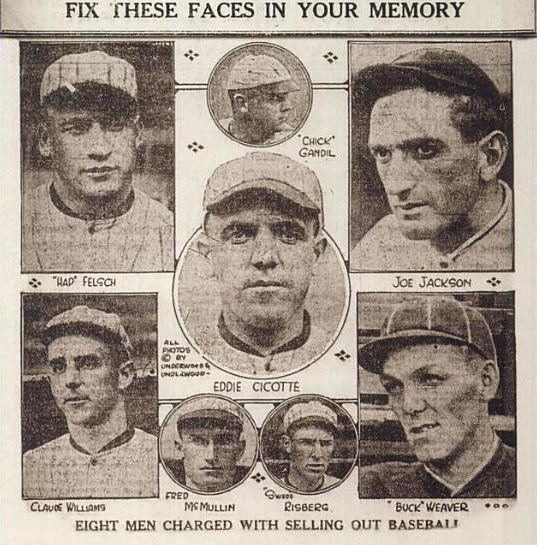Rob Manfred will not reinstate Shoeless Joe Jackson
In an answer to the plea of the Joe Jackson Museum in Greenville SC, Rob Manfred stated in a letter that he will not reinstate Joe Jackson. This means that he will remain ineligible for the Hall of Fame.
Together with seven of his fellow White Sox players, Jackson was banned in 1921 for allegedly throwing the 1919 World Series vs the Cincinnati Reds. As some players were approached by gamblers to fix the series in exchange for $100,000  for the group as a whole. One of the players that attended the meetings in which the bribery was discussed was Buck Weaver. He decided not to take part in the fix but eventually was banned as well because he knew about the fix and didn’t sound the alarm bell. The story goes that Pitcher Eddie Cicotte eventually decided to accept money from the gamblers when he discovered that Charles Comiskey had ordered manager Kid Gleason to bench him to make it impossible for him to reach 30 wins. Comiskey allegedly had promised Cicotte a bonus if he would clinch 30 victories that season.
for the group as a whole. One of the players that attended the meetings in which the bribery was discussed was Buck Weaver. He decided not to take part in the fix but eventually was banned as well because he knew about the fix and didn’t sound the alarm bell. The story goes that Pitcher Eddie Cicotte eventually decided to accept money from the gamblers when he discovered that Charles Comiskey had ordered manager Kid Gleason to bench him to make it impossible for him to reach 30 wins. Comiskey allegedly had promised Cicotte a bonus if he would clinch 30 victories that season.
Eventually the fix was discovered and a grand jury was instated to investigate the rumors about the bribery. Eventually the grand jury came out with a report that eight players and five gamblers were involved in what would be know the Black Sox Scandal. After a trial in 1921 the verdict of the jury was “not guilty”.
In 1921 the MLB owners instated Judge Kenesaw Mountain Landis as the commissioner of baseball. Landis had unlimited and unchecked powers and decided to ban all eight players that were allegedly involved in the Black Sox Scandal. Several of them admitted their role in the fix when testifying before the grand jury in 1920, and one of them was Joe Jackson.
 The testimony of Jackson in 1920 said the following: “When a Cincinnati player would bat a ball out in my territory I’d muff it if I could—that is, fail to catch it. But if it would look too much like crooked work to do that I’d be slow and make a throw to the infield that would be short. My work netted the Cincinnati team several runs that they never would have had if we had been playing on the square.” But no such exact words cannot be found in the grand jury’s stenographic record of Jackson’s testimony, so it casts some doubt on the fact if this quote is true.
The testimony of Jackson in 1920 said the following: “When a Cincinnati player would bat a ball out in my territory I’d muff it if I could—that is, fail to catch it. But if it would look too much like crooked work to do that I’d be slow and make a throw to the infield that would be short. My work netted the Cincinnati team several runs that they never would have had if we had been playing on the square.” But no such exact words cannot be found in the grand jury’s stenographic record of Jackson’s testimony, so it casts some doubt on the fact if this quote is true.
But when you look to the stats that Jackson posted during the 1919 World Series, you can hardly say that he fixed the games. During the regular season he hit .351 and in the World Series his average was even higher: .375. He led both World Series teams in several individual statistics, committed no errors and even threw out a runner at the plate.
Later Jackson would recall his statement of having accepted $5,000 from the gamblers and he kept denying for the rest of his life that he participated in the bribe.
Several studies, books and articles have been published ever since “proving” the guilt or innocence of Jackson.
Anyhow, the Joe Jackson museum stated in a Facebook post, three days ago, that Rob Manfred answered in a letter,
dated July 20, that it would not be appropriate for him to reopen this matter. “The results of this work demonstrate to me that it is not possible now, over 95 years since those events took place and were considered by Commissioner Landis, to
be certain enough of the truth to overrule Commissioner Landis’ determinations.”
Since Landis thought that the prestige and honor of baseball was harmed, he decided to ban the eight players from Major League Baseball to clean up its public image, despite the fact that the jury’s verdict was “not guilty”.
If Rob Manfred may decide to reinstate Pete Rose (who betted against his own team while managing the Cincinnati Reds) any time, he will create a precedent.
